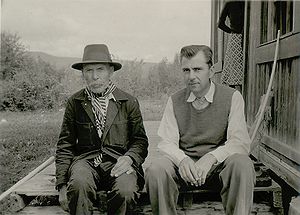Julian Haynes Steward
| Julian Haynes Steward | |
|---|---|

Unidentified Native Man (Carrier Indian) (possibly Steward's informant, Chief Louis Billy Prince) and Julian Steward (1902–1972) Outside Wood Building, 1940
|
|
| Born |
January 31, 1902 Washington, D.C., |
| Died | February 6, 1972 (aged 70) Urbana, Illinois |
| Education |
B.A. in Zoology, Cornell University (1925) M.A. in Anthropology, University of California, Berkeley (1928) Ph.D. in Anthropology, University of California, Berkeley (1929) |
| Occupation | Anthropologist |
| Spouse(s) |
Dorothy Nyswander (1894–1998) (married 1930–1932); Jane Cannon Steward (1908–1988) (married 1933–1972) |
| Children |
Garriott Steward Michael Steward two grandchildren |
B.A. in Zoology, Cornell University (1925) M.A. in Anthropology, University of California, Berkeley (1928)
Dorothy Nyswander (1894–1998) (married 1930–1932);
Garriott Steward Michael Steward
Julian Haynes Steward (January 31, 1902 – February 6, 1972) was an American anthropologist best known for his role in developing "the concept and method" of cultural ecology, as well as a scientific theory of culture change.
Steward was born in Washington, D.C., where he lived on Monroe Street, NW, and later, Macomb Street in Cleveland Park.
At age 16, Steward left an unhappy childhood in Washington, D.C. to attend boarding school in Deep Springs Valley, California, in the Great Basin. Steward's experience at the newly established Deep Springs Preparatory School (which later became Deep Springs College), high in the White Mountains had a significant influence on his academic and career interests. Steward’s “direct engagement” with the land (specifically, subsistence through irrigation and ranching) and the Northern Paiute that lived there became a “catalyst” for his theory and method of cultural ecology. (Kerns 1999; Murphy 1977)
As an undergraduate, Steward studied for a year at Berkeley under Alfred Kroeber and Robert Lowie, after which he transferred to Cornell University, from which he graduated in 1925 with a B.Sc. in Zoology. Although Cornell, like most universities at the time, had no anthropology department, its president, Livingston Farrand, had previously held appointment as a professor of anthropology at Columbia University. Farrand advised Steward to continue pursuing his interest (or, in Steward's words, his already chosen "life work") in anthropology at Berkeley (Kerns 2003:71–72). Steward studied under Kroeber and Lowie—and was taught by Oskar Schmieder in regional geography—at Berkeley, where his dissertation The Ceremonial Buffoon of the American Indian, a Study of Ritualized Clowning and Role Reversals was accepted in 1929.
...
Wikipedia
